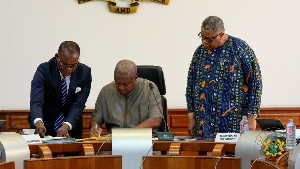The Deputy Minister of Environment Science, Technology and Innovation (MESTI), Muheibu Mohammed-Alfa, has advised businesses to devote their attention to the production of products and services that will have minimal effect on the climate.
He said the threats posed by climate change have informed consumers to demand products that are friendly to the environment.
He said the shift in consumer taste and preference is an opportunity for local businesses to come up with products that meet demands of the consuming public.
“The climate challenge offers us as a developing country a number of opportunities with respect to additional financing, leapfrogging of technology, and regional integration through innovative programmes and projects,” he said.
Mr. Mohammed-Alfa said this at a stakeholder consultation workshop on the establishment of a Climate Innovation Centre (CIC) in the country, in Accra. The workshop was organised by InfoDev, a global partnership of the World Bank.
He cited that the recycling of plastic waste, renewable energy and the development of clean and environmentally-friendly technologies are opportunities presented by climate change that entrepreneurs can take advantage of.
He said the government has teamed up with other stakeholders to set up the CIC in a bid to provide a dedicated facility that will aid in the creation and production of climate-friendly products.
“Climate change pose a challenge to humanity and the environment, but with the CIC in place the country can position itself to take advantage of the numerous opportunities it provides in challenging technological developments,” Mohammed-Alfa noted.
The CIC is expected to assist existing and start-up entrepreneurs with financial assistance, coaching and mentoring, and provision of technical support.
The objectives of the feasibility assessment process is to identify the types of opportunities that exist for the SMEs in the clean technology industry in Ghana, and determine how best to unlock these opportunities through a CIC.
The workshop brought together over 100 stakeholders to assess the viability of a CIC model designed for the local environment. The CIC-proposed models included: Venture Acceleration, Access to Finance, Market Development, Technology and Product Development, and Policy Regulatory Support.
Deputy Minister of Trade and Industry, Nii Lantey Vanderpuije, acknowledged that the energy sector is a major emitter of carbon dioxide which contributes to warming of the climate, and called for clean technologies to address energy challenges without hurting the environment.
“With the energy sector responsible for the majority of carbon dioxide emissions, green growth policies are the only way out to cut down on the energy-related emissions of carbon dioxide by using a combination of existing and new technologies,” he said.
He called on stakeholders to make adequate arrangements that will ensure sustainability and continuity of the CIC after withdrawal of funding and technical support from the development partners.
“As we deliberate on the structure and other institutional arrangements to be developed for the CIC in Ghana, we must be mindful of the investment involved and the centre’s sustainability after withdrawal of the initial funding and technical support by development partners,” he cautioned.
Business News of Monday, 16 September 2013
Source: B&FT
Firms urged to produce quality goods
Entertainment

Daddy Lumba's 'ghost' is tormenting us – Aunt cries out
Opinions









